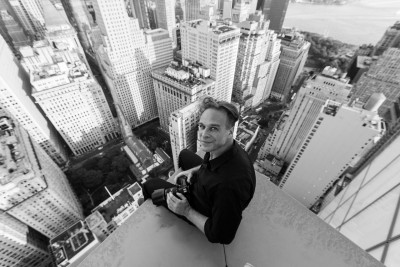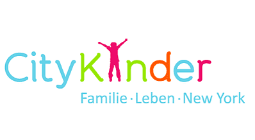What makes German, Austrian and Swiss people come to America? What do they love about the country and what do they miss about home? In each issue, we will introduce a German-speaking immigrant or expat. In this issue: the Photographer Karsten Staiger.
On a freezing cold day in New York, I met photographer Karsten Staiger in his office near Penn Station where I was able to witness a very special family reunion. Karsten’s brother, Alexander was visiting New York for the first time in almost two decades.
The two share a moving family story and during the exciting conversation that ensued I’m sure not only myself, but also Alexander learned some interesting things about his brother’s life and work in New York City.
You arrived in New York in 1995 - did you intend to stay from the very beginning? At that time I literally was ready to leave Germany for a while. After I had quit my graphics design studies in Stuttgart, I planned to go to Rome where I had already applied for a scholarship as I actually wanted to become a painter. While I was waiting to see if I was accepted, I traveled to New York with a friend – and immediately fell in love with the city.
What did you do when you got to New York? I started painting and sold my first pictures fairly quickly. But I had to go back to Germany one more time and then returned with 2 suitcases, a guitar, $500 in my pocket and the intention to stay. At first I entered and left the U.S. as a tourist, which went well for a while, until autumn of 1998, when an immigration officer urged me to adjust my residence status sooner than later. My girlfriend at the time was with me in the cab and on the way from the airport to the city, we spontaneously decided to get married. However in October 1998, I was busy preparing my first exhibition at the German Consulate General so we pushed it until December 1998 when we finally got married.
What fascinates you about New York? What inspires you as an artist? I grew up in a small village in the Black Forest and never really fit into the quite structured way of life there. In New York, I felt I was able to truly be myself for the first time. I could reinvent myself, learn a new language, and I didn’t have a country I needed to identify with ... But I never became an American citizen and am still proud to be German and European.
Do you think that you would have had the same success if you had stayed in Germany? I don’t think so, although success is relative, of course. I have a different perspective of myself than other people do. I live in "crazy worlds" and get to meet many famous people, but I’m still just Karsten. I am clear about who I am and where I come from. I am grateful for my roots.
I can imagine that today, as an artist, it is more important than ever to sell not only your work but also yourself as a person. Are you comfortable with that? It is still hard for me to sell myself and I always hope that my work speaks for itself. Luckily, I have a lot of contacts now and established a certain name for myself in the industry, so I’m always busy. Over the years a lot of projects have come to me via recommendations which I love.
Is that how you came about your big project with the band Foreigner? Yes, a friend of mine already worked with Mick Jones, the founder of Foreigner, on a project with a full orchestra in Switzerland. A few weeks later I, too, was on my way to Lucerne and later on tour in Germany. In the past few years I was lucky to experience a lot of new things such as touring with a rock band and documenting them on camera, video and images - which means a lot to me.
Alexander, while you are here, let me ask you: Could you already see Karsten’s artistic talent when he was a kid? Was his talent fostered? Alexander: Karsten always had a pen in his hand and was drawing things and designed logos, but as a kid you don’t necessarily realize a special talent in your brother. That was just who he was ...
Karsten: My talent wasn’t fostered, because our family situation was difficult. Our parents died early. We were separated and forced to grow up in different families and were hardly allowed to see each other. So, in a sense, I lost my brother, too. Getting myself out of that place, coming to terms with my own story and transforming it into creativity – that was not an easy road, but creativity also helped me through difficult times. For years, I tried to maintain contact with Alexander, but several people put themselves between us and at some point I had to let him go. We are getting to know each other better again now and are working on putting the past behind us.
Karsten, what are your main projects right now?I'm always working on “New York Love Story”, (→www.newyorklovestory.com), a collection of pictures from the rooftops of New York. I rarely take rooftop pictures right now, but I have accumulated so much material and I plan to turn it into a movie eventually. Apart from that, I am very busy with the documentation and other projects for Foreigner. There is also a lot of material that needs to be processed. Another project I’m involved in is called “The Way of the Rain” (→ www.thewayoftherain.org).
You took pictures from over 100 rooftops in Manhattan. Was that sometimes dangerous? Do you have a few favorites? Dangerous … yes, of course, but it depends whom you are asking. I’m very “present” when I’m on a rooftop, happy and free. There are a few buildings and situations I like to think about - like making it onto some rooftops where generally no-one else gets access to or some situations few people like to be in voluntarily - like hanging out in a window washer’s rig on the 65th floor.
Where is your art currently on display?A large part of my installations are still on display at 28 Liberty in Manhattan, however, some of them have been brought up to the new restaurant MANHATTA on the 60th floor. I’m also working on a digital wall and planning an exhibit in Germany.
Karsten and Alexander, thank you for the interview.
Gabi Hegan
You can see more of Karsten's work at: http://karstenstaiger.com






